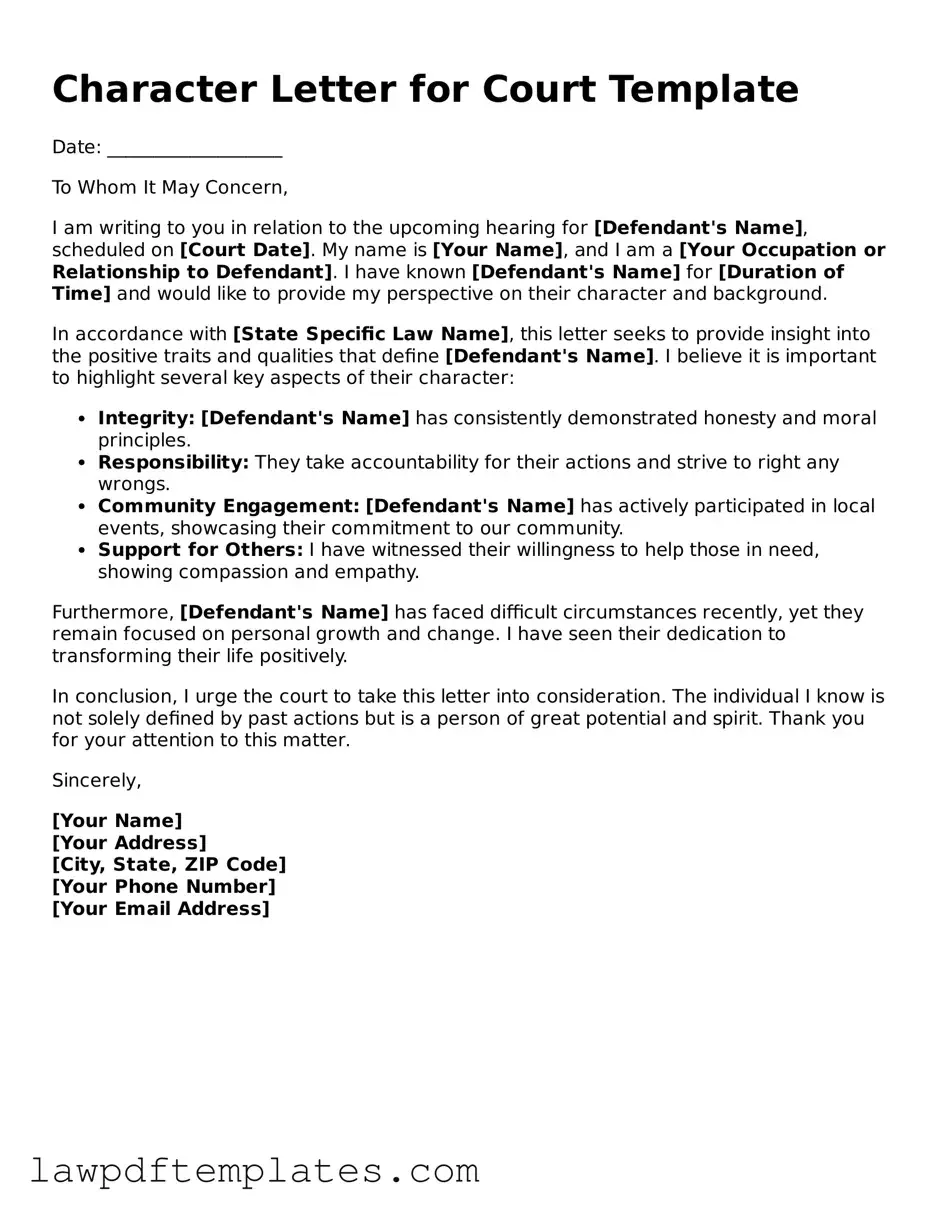Attorney-Approved Character Letter for Court Document
Form Breakdown
| Fact Name | Description |
|---|---|
| Purpose | A Character Letter for Court is intended to provide the judge with insight into the character and reputation of an individual involved in a legal matter. |
| Format | Typically, the letter should be written in a formal tone, addressing the court and including the writer's relationship to the individual, along with specific examples of positive character traits. |
| State-Specific Guidelines | Each state may have its own guidelines regarding the submission of character letters. For example, California courts encourage letters to be concise and relevant to the case at hand. |
| Submission Process | Character letters are often submitted to the court before a hearing, and they may need to be filed with other court documents or presented directly to the judge during the proceedings. |
Sample - Character Letter for Court Form
Character Letter for Court Template
Date: ___________________
To Whom It May Concern,
I am writing to you in relation to the upcoming hearing for [Defendant's Name], scheduled on [Court Date]. My name is [Your Name], and I am a [Your Occupation or Relationship to Defendant]. I have known [Defendant's Name] for [Duration of Time] and would like to provide my perspective on their character and background.
In accordance with [State Specific Law Name], this letter seeks to provide insight into the positive traits and qualities that define [Defendant's Name]. I believe it is important to highlight several key aspects of their character:
- Integrity: [Defendant's Name] has consistently demonstrated honesty and moral principles.
- Responsibility: They take accountability for their actions and strive to right any wrongs.
- Community Engagement: [Defendant's Name] has actively participated in local events, showcasing their commitment to our community.
- Support for Others: I have witnessed their willingness to help those in need, showing compassion and empathy.
Furthermore, [Defendant's Name] has faced difficult circumstances recently, yet they remain focused on personal growth and change. I have seen their dedication to transforming their life positively.
In conclusion, I urge the court to take this letter into consideration. The individual I know is not solely defined by past actions but is a person of great potential and spirit. Thank you for your attention to this matter.
Sincerely,
[Your Name]
[Your Address]
[City, State, ZIP Code]
[Your Phone Number]
[Your Email Address]
Common mistakes
Filling out a Character Letter for Court can be a crucial step in legal proceedings. However, many individuals make common mistakes that can undermine the effectiveness of their letter. One frequent error is failing to address the letter to the appropriate recipient. It is essential to know whether the letter should be directed to a judge, a probation officer, or another party involved in the case. Without proper addressing, the letter may not reach the intended audience, diminishing its impact.
Another mistake often made is neglecting to provide specific examples of the person's character. Generic statements about someone's kindness or reliability do not carry as much weight as detailed anecdotes that illustrate these traits. Personal stories can paint a vivid picture of the individual's character, making the letter more compelling and credible.
Many people also overlook the importance of maintaining a respectful and formal tone. A Character Letter for Court is not the place for casual language or overly emotional expressions. Instead, a professional tone should be maintained throughout the letter. This helps to convey seriousness and respect for the court's proceedings.
Additionally, some individuals fail to include their own credentials or relationship to the person in question. It is important to establish who you are and how you know the individual. This context helps the reader understand the basis of your opinions and lends credibility to your statements. Without this information, the letter may seem less authoritative.
Another common mistake is writing a letter that is too long or too short. A concise letter that gets straight to the point is often more effective than one that is overly lengthy and filled with unnecessary details. On the other hand, a letter that is too brief may lack the substance needed to make a meaningful impression. Aim for a balance that provides enough information without overwhelming the reader.
Furthermore, some people forget to proofread their letters. Spelling and grammatical errors can detract from the professionalism of the letter. A well-written document reflects attention to detail and respect for the court. Taking the time to review and edit can make a significant difference in how the letter is perceived.
Lastly, individuals may neglect to sign and date the letter. A signature adds a personal touch and verifies authenticity. Including the date shows when the letter was written, which can be relevant in legal contexts. Omitting these elements can leave the letter feeling incomplete and unprofessional.
Consider Popular Types of Character Letter for Court Documents
Letter of Recommendation Nursing - The applicant maintains accurate and thorough medical records to support quality care delivery.
When dealing with custody arrangements, it is essential to understand the importance of a well-crafted Character Reference Letter for Child Custody, which showcases the positive attributes of the parent and their ability to care for their child. For more guidance, check out this useful resource: Comprehensive Character Reference Letter for Child Custody.
Sorority Recommendation Letter for Someone You Don T Know - Highlight unique qualities of a candidate that would enrich the sorority experience.
Adoption Recommendation Letter - A brief guide for writing compelling letters of recommendation for adoption proceedings.
